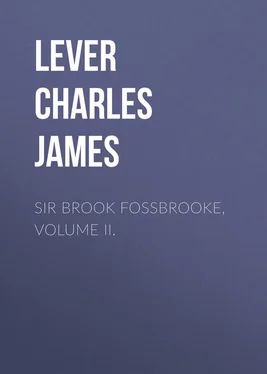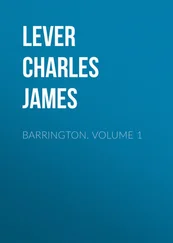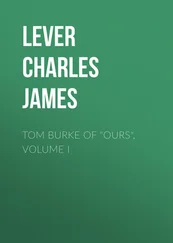Charles Lever - Sir Brook Fossbrooke, Volume II.
Здесь есть возможность читать онлайн «Charles Lever - Sir Brook Fossbrooke, Volume II.» — ознакомительный отрывок электронной книги совершенно бесплатно, а после прочтения отрывка купить полную версию. В некоторых случаях можно слушать аудио, скачать через торрент в формате fb2 и присутствует краткое содержание. Жанр: literature_19, foreign_antique, foreign_prose, на английском языке. Описание произведения, (предисловие) а так же отзывы посетителей доступны на портале библиотеки ЛибКат.
- Название:Sir Brook Fossbrooke, Volume II.
- Автор:
- Жанр:
- Год:неизвестен
- ISBN:нет данных
- Рейтинг книги:4 / 5. Голосов: 1
-
Избранное:Добавить в избранное
- Отзывы:
-
Ваша оценка:
- 80
- 1
- 2
- 3
- 4
- 5
Sir Brook Fossbrooke, Volume II.: краткое содержание, описание и аннотация
Предлагаем к чтению аннотацию, описание, краткое содержание или предисловие (зависит от того, что написал сам автор книги «Sir Brook Fossbrooke, Volume II.»). Если вы не нашли необходимую информацию о книге — напишите в комментариях, мы постараемся отыскать её.
Sir Brook Fossbrooke, Volume II. — читать онлайн ознакомительный отрывок
Ниже представлен текст книги, разбитый по страницам. Система сохранения места последней прочитанной страницы, позволяет с удобством читать онлайн бесплатно книгу «Sir Brook Fossbrooke, Volume II.», без необходимости каждый раз заново искать на чём Вы остановились. Поставьте закладку, и сможете в любой момент перейти на страницу, на которой закончили чтение.
Интервал:
Закладка:
“I own,” said the Judge, slowly, “it has often struck me as strange how little animadversion the Press bestowed upon my English colleagues for their advanced years, and how persistently they commented on mine; and yet the history of Ireland does not point to the early decline of intellectual power. They are fond of showing the characteristics that separate us, but they have never adduced this one.”
“I hope I have your Lordship’s forgiveness for my boldness,” said Sewell, with humility.
“You have more, sir, – you have my gratitude for an affectionate solicitude. I will think over what you have said when I am alone.”
“It will make me a very proud man if I find that my words have had weight with you. I am to tell Beattie, my Lord, that you are engaged, and cannot see him?” said he, moving towards the door.
“Yes. Say that I am occupied with my reply to this slander. Tell him if he likes to dine with me at six – ”
“I beg pardon, my Lord – but my wife hoped you would dine with us to-day. We have a few young soldiers, and two or three pretty women coming to us – ”
“Make my compliments to Mrs. Sewell, and say I am charmed to accept her invitation.”
Sewell took his leave with every token of respectful gratitude. But no sooner had he reached the stairs than he burst into a fit of laughter. “Would any one have believed that the old fool would have swallowed the bait? I was so terrified at my own temerity, I ‘d have given the world to be out of the scrape! I declare, if my mother could be got rid of, we ‘d have him leading something of sixteen to the altar. Well, if this acute attack of youth does n’t finish him, he must have the constitution of an elephant.”
CHAPTER VII. HOW TO MEET A SCANDAL
When the Government of the day had found that all their efforts to induce the Chief Baron to retire from the Bench were failures, – when they saw him firmly decided to accept nothing less than that price which they would not pay, – with a littleness which, it is but fair to own, took its origin from Mr. Cholmondely Balfour, they determined to pass upon him a slight which he could not but feel most painfully.
It happened in this wise. At the time I speak of Ireland was suffering from one of those spasmodic attacks of rebellion which every now and then occur through the chronic disaffection of the country, just as certain eruptions are thrown out over the body to relieve, as is supposed, some feverish tendencies of the system.
Now, although the native thinks no more of these passing troubles than would an old Indian of an attack of the “prickly heat,” to the English mind they always suggest danger, tend to increase the military force of the kingdom, and bring on in Parliament one of those Irish debates – a political sham fight – where, though there is a good deal of smoke, bustle, and confusion, nobody is hurt, nor, if the truth be told, is any one the better when it is over.
Through such a paroxysm was Ireland now passing. It matters little to our purpose to give it a specific name, for the Whiteboy or the Rockite, the Terry-alt, the Ribbonman, or the Fenian are the same; there being only one character in this dreary drama, however acute Viceroys and energetic secretaries may affect to think they are “assisting” at the representation of a perfectly new piece, with new scenery, dresses, and decorations.
In ordinary disturbances in Ireland, whenever they rose above the dignity of local mischief, the assistance and sympathy of France was always used as a sort of menace to England. It was a threat very certain to irritate, if it did no more. As, however, by course of time, we grew to form closer relations with France, – to believe, or affect to believe, – I am not very sure which, – that we had outlived old grudges, and had become rather ashamed of old rivalries, France could not be employed as the bugbear it had once been. Fortunately for Irish rebellion, America was quite prepared to take the vacant post, and with this immense additional gain, that the use of our own language enabled our disaffected in the States to revile us with a freedom and a vigor which, if there be that benefit which is said to exist in “seeing ourselves as others see us,” ought unquestionably to redound to our future good.
The present movement had gone so far as to fill the public mind with terror, and our jails with suspected traitors. To try these men a special commission had been named by the Government, from which, contrary to custom, the Chief Baron had been omitted. Nor was this all. The various newspapers supposed to be organs, or at least advocates, of the Ministry, kept up a continuous stream of comment on the grave injury to a country, at a crisis like that then present, to have one of its chief judicial seats occupied by one whose age and infirmities totally disabled him from rendering those services which the Crown and the nation alike had a right to expect from him.
Stories, for the most part untrue, of the Chief Baron’s mistakes on the Bench appeared daily. Imaginary suitors, angry solicitors, and such-like – the Bar was too dignified to join in the cry – wrote letters averring this, that, or the other cruel wrong inflicted upon them through the “senile incapacity of this obstructive and vain old man.”
Never was there a less adroit tactic. Every insult they hurled at him only suggested a fresh resolve to hold his ground. To attack such a man was to evoke every spark of vigorous resistance in his nature, to stimulate energies which nothing short of outrage could awaken, and to call into activity powers which, in the ordinary course of events, would have fallen into decline and decay. As he expressed it, “in trying to extinguish the lamp they have only trimmed the wick.” When, through Sewell’s pernicious counsels, the old Judge determined to convince the world of his judicial fitness by coming out a young man, dressed in the latest fashion, and affecting in his gait and manner the last fopperies of the day, all the reserve which respect for his great abilities had imposed was thrown aside, and the papers now assailed him with a ridicule that was downright indecent. The print shops, too, took up the theme, and the windows were filled with caricatures of every imaginable degree of absurdity.
There was one man to whom these offensive attacks gave pain only inferior to what they inflicted on the Chief himself, – this was his friend Haire. To have lived to see the great object of all his homage thus treated by an ungrateful country, seemed to him the direst of all calamities. Over and over did he ponder with himself whether such depravity of public feeling portended the coming decline of the nation, and whether such gross forgetfulness of great services was not to be taken as a sign of approaching dissolution.
It was true that since the Sewells had taken up their residence at the Priory he had seen but little of his distinguished friend. All the habits, the hours, and the associations of the house had been changed. The old butler, who used to receive Haire when he arrived on terms of humble friendship, telling him in confidence, before he went in, the temper in which he should find the Judge, what crosses or worries had recently befallen him, and what themes it might be discreet to avoid, – he was pensioned off, and in his place a smart Englishman, Mr. Cheetor, now figured, – a gentleman whose every accent, not to speak of his dress, would have awed poor Haire into downright subjection. The large back hall, through which you passed into the garden, – a favorite stroll of Haire’s in olden times, – was now a billiard room, and generally filled with fine ladies and gentlemen engaged in playing; the very sight of a lady with a billiard cue, and not impossibly a cigarette, being shocks to the old man’s notions only short of seeing the fair delinquent led off to the watchhouse. The drowsy quietude of the place, so grateful after the crush and tumult of a city, was gone; and there was the clang of a pianoforte, the rattle of the billiard balls, the loud talk and loud laughter of morning visitors, in its stead. The quaint old gray liveries were changed for coats of brilliant claret color. Even to the time-honored glass of brandy-and-water which welcomed Haire as he walked out from town there was revolution; and the measure of the old man’s discomfiture was complete as the silvery-tongued butler offered him his choice of hock and seltzer or claret-cup!
Читать дальшеИнтервал:
Закладка:
Похожие книги на «Sir Brook Fossbrooke, Volume II.»
Представляем Вашему вниманию похожие книги на «Sir Brook Fossbrooke, Volume II.» списком для выбора. Мы отобрали схожую по названию и смыслу литературу в надежде предоставить читателям больше вариантов отыскать новые, интересные, ещё непрочитанные произведения.
Обсуждение, отзывы о книге «Sir Brook Fossbrooke, Volume II.» и просто собственные мнения читателей. Оставьте ваши комментарии, напишите, что Вы думаете о произведении, его смысле или главных героях. Укажите что конкретно понравилось, а что нет, и почему Вы так считаете.












